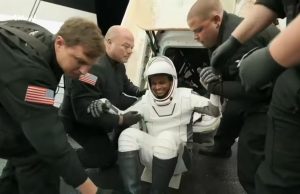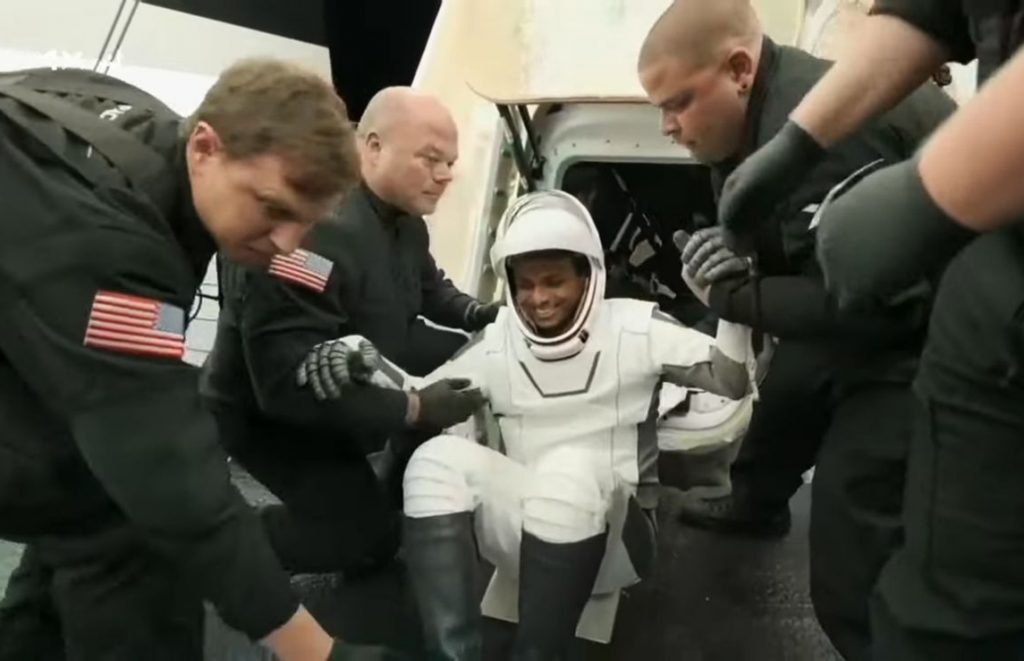NEW DELHI, Jul 15: As the Dragon spacecraft carrying astronaut Shubhanshu Shukla returned to Earth after an 18-day stay aboard the International Space Station (ISS), it carried with it more than just scientific data and seed samples, it brought home a story of grit, dreams, and India’s growing space ambitions.
Group Captain Shukla, a 39-year-old Indian Air Force officer and test pilot, completed his maiden space voyage as part of the Axiom-4 mission, a commercial spaceflight supported by ISRO and NASA, and operated by Axiom Space.
The journey marked a milestone for India: Shukla is the first Indian to step aboard the ISS and only the second Indian to go into space, following Rakesh Sharma’s iconic flight in 1984.
Born on October 10, 1985—just a year after Sharma’s spaceflight—Shukla grew up in Lucknow in a middle-class family with no direct links to aviation or space. But a childhood visit to an airshow lit a spark.
“As a child, he had once been to an air show and was fascinated by the speed and sound of the aircraft. That’s when he first spoke about flying,” his elder sister Suchi Shukla said. “But of course, there was no telling at the time how quickly he would embrace his dream.”
Educated at City Montessori School (CMS), Shukla’s journey to the stars was anything but scripted. In a stroke of destiny, a classmate applying to the National Defence Academy (NDA) realised he was overage and passed on the form to Shukla.
He was commissioned into the Indian Air Force in 2006 and went on to become a decorated test pilot with over 2,000 hours of flying time on advanced fighter aircraft such as the Su-30 MKI, MiG-29, Jaguar, and Dornier-228. He later earned an MTech in Aerospace Engineering from the Indian Institute of Science, Bengaluru.
Last year, he was chosen as one of four astronauts in India’s Gaganyaan programme, alongside Prasanth Balkrishnan Nair, Angad Pratap, and Ajit Krishnan.
The quartet underwent intensive training in Russia’s Gagarin Cosmonaut Training Centre and ISRO’s Astronaut Training Facility in Bengaluru. But before Gaganyaan’s scheduled launch in 2027, Shukla got the opportunity to fly as part of the Ax-4 crew—an Indian was part of a human spaceflight mission after 41 years.
After several postponements, Shukla finally launched from the Kennedy Space Center on June 25, aboard the SpaceX Falcon 9 rocket. Ten minutes into the mission, the Dragon capsule entered orbit, prompting Shukla to declare in Hindi, “Kamaal ki ride thi” (“It was a great ride”) and share his sense of national pride: “I have the Indian tricolour embossed on my shoulders that tells me I am with all of you.”
Nicknamed “Shux” and known for his composed demeanour, Shukla carried Indian delicacies to space, including gajar ka halwa and moong dal ka halwa, so his international crewmates could get a taste of home.
His launch-day song “Yun Hi Chala Chal” from the Shah Rukh Khan film Swades turned out to be a fitting choice for an astronaut on a mission about discovery, identity, and the journey home.
On board the ISS, Shukla was the pilot on the Axiom-4 mission, alongside commander Peggy Whitson and mission specialists Slawosz Uznanski-Wisniewski of Poland and Tibor Kapu of Hungary. Together, they not only conducted science experiments but also engaged in outreach to students and space communities across the globe.
Shukla conducted seven India-led microgravity experiments across diverse domains of life sciences, agriculture, space biotechnology, and cognitive research.
“I am so proud that ISRO has been able to collaborate with national institutions all over the country and come up with some fantastic research, which I am doing here on the station,” Shukla said during an interaction with Axiom’s chief scientist Lucie Low.A highlight was the plant germination experiment led by scientists Ravikumar Hosamani (University of Agricultural Sciences, Dharwad) and Sudheer Siddapureddy (IIT Dharwad). Shukla planted moong and methi seeds in petri dishes and captured their sprouting progress, inserting them into cold storage for later analysis back on Earth.
The goal is to study how microgravity influences plant growth, microbial interactions, and genetic expression, which are key insights for long-term space farming.
In another project, he worked with cyanobacteria and microalgae, which are organisms being explored for their ability to produce food, oxygen, and biofuels in space. These tiny life forms may hold the key to sustainable life-support systems during deep space missions.
He also participated in stem cell research, exploring whether supplements can aid in injury repair and tissue regeneration in space. “It’s been great to work in the Glove Box doing this research. I feel proud to be a bridge between scientists on Earth and the station,” Shukla said.
One of his lighter experiments was a zero-gravity demonstration involving water.
Shukla created a floating water bubble and joked, “I’ve become a water bender here on the station,” as his commander used a plastic bag to show how surface tension manipulates light in space like a lens.
As the mission neared completion, Shukla and his Ax-4 crewmates joined astronauts of Expedition 73, a long-duration mission, for a farewell ceremony on July 13. In his remarks, he thanked the ISS crew and ISRO for its support in developing a research portfolio and an outreach programme for students and STEM communities in India.
Shukla interacted with Prime Minister Narendra Modi, school students, and also connected with ISRO centres using amateur radio. “It’s not just my journey, it’s India’s,” he said.
“From a curious young learner in our classrooms to a pioneering astronaut, Shux’s story beautifully encapsulates our mission of ‘Education for World Unity and Peace’,” said Geeta Gandhi Kingdon, a student at CMS, Lucknow, during the watch party the school had organised for the launch of the mission.
Shukla’s mission ends with Dragon ‘Grace’ spacecraft’s splash down near the California coast on Tuesday but his story will continue.
With Gaganyaan on the horizon and new avenues in space research opening up, his experience is expected to be instrumental in shaping India’s human spaceflight programme.
In Shukla’s own words from the station: “I want each one of you to be part of this journey. Let us embark on India’s human space programme together.”


